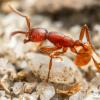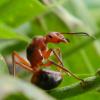Poneriencat, I have my sights set on one species: Stigmatomma trigonignathum. I plan on taking a weekend camping trip to North Carolina where I believe it is distributed specifically to try to find this species and hopefully a colony, so if Lady Luck has been with me so far, perhaps she will smile on me for this species.
Good luck with that! Stigmatomma trigonagnathum is one of the rarest ants in existence, with the holotype discovered in 1948 and an accidental discovery in 2008. If you do manage to find a colony of this species, you will be one of the luckiest anters in existence!

















